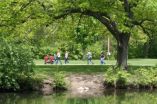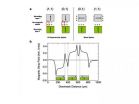(Press-News.org) Research shows that a walk in the park is more than just a nice way to spend an afternoon. It's an essential component for good health, according to University of Illinois environment and behavior researcher Frances "Ming" Kuo.
"Through the decades, parks advocates, landscape architects, and popular writers have consistently claimed that nature had healing powers," Kuo said. "But until recently, their claims haven't undergone rigorous scientific assessment."
Kuo is also the director of the Landscape and Human Health Laboratory at the U of I and has studied the effect of green space on humans in a number of settings in order to prove or disprove the folklore notions.
"Researchers have studied the effects of nature in many different populations, using many forms of nature," Kuo said. "They've looked at Chicago public housing residents living in high-rises with a tree or two and some grass outside their apartment buildings; college students exposed to slide shows of natural scenes while sitting in a classroom; children with attention deficit disorder playing in a wide range of settings; senior citizens in Tokyo with varying degrees of access to green walkable streets; and middle-class volunteers spending their Saturdays restoring prairie ecosystems, just to name a few."
Kuo says that although the diversity of the research on this subject is impressive and important, even more important is the rigor with which the work was conducted.
"In any field with enthusiasts, you will find a plethora of well-meaning but flimsy studies purporting to 'prove' the benefits of X," Kuo said. "But in the last decade or so, rigorous work on this question has become more of a rule than an exception. The studies aren't simply relying on what research participants report to be the benefits of nature. The benefits have been measured objectively using data such as police crime reports, blood pressure, performance on standardized neurocognitive tests, and physiological measures of immune system functioning."
Kuo said that rather than relying on small, self-selected samples of nature lovers such as park-goers, scientists are increasingly relying on study populations that have no particular relationship to nature. One study examined children who were receiving care from a clinic network targeting low-income populations. Another looked at all United Kingdom residents younger than retirement age listed in national mortality records for the years 2001-2005.
"Scientists are routinely taking into account income and other differences in their studies. So the question is no longer, do people living in greener neighborhoods have better health outcomes? (They do.) Rather, the question has become, do people living in greener neighborhoods have better health outcomes when we take income and other advantages associated with greener neighborhoods into account?" That answer is also, yes, according to Kuo.
After undergoing rigorous scientific scrutiny, Kuo says the benefits of nature still stand.
"We still find these benefits when they are measured objectively, when non-nature lovers are included in our studies, when income and other factors that could explain a nature-health link are taken into account. And the strength, consistency and convergence of the findings are remarkable," she said.
Kuo drew an analogy to animals. "Just as rats and other laboratory animals housed in unfit environments undergo systematic breakdowns in healthy, positive patterns of social functioning, so do people," she said.
"In greener settings, we find that people are more generous and more sociable. We find stronger neighborhood social ties and greater sense of community, more mutual trust and willingness to help others.
"In less green environments, we find higher rates of aggression, violence, violent crime, and property crime—even after controlling for income and other differences," she said. "We also find more evidence of loneliness and more individuals reporting inadequate social support."
The equation seems too simple to be true.
Access to nature and green environments yields better cognitive functioning, more self-discipline and impulse control, and greater mental health overall.
Less access to nature is linked to exacerbated attention deficit/hyperactivity disorder symptoms, higher rates of anxiety disorders, and higher rates of clinical depression.
If that isn't convincing enough, Kuo says the impacts of parks and green environments on human health extend beyond social and psychological health outcomes to include physical health outcomes.
Greener environments enhance recovery from surgery, enable and support higher levels of physical activity, improve immune system functioning, help diabetics achieve healthier blood glucose levels, and improve functional health status and independent living skills among older adults.
By contrast, environments with less green space are associated with greater rates of childhood obesity; higher rates of 15 out of 24 categories of physician-diagnosed diseases, including cardiovascular diseases; and higher rates of mortality in younger and older adults.
"While it is true that richer people tend to have both greater access to nature and better physical health outcomes, the comparisons here show that even among people of the same socioeconomic status, those who have greater access to nature, have better physical health outcomes. Rarely do the scientific findings on any question align so clearly."
Because of this strong correlation between nature and health, Kuo encourages city planners to design communities with more public green spaces in mind, not as mere amenities to beautify a neighborhood, but as a vital component that will promote healthier, kinder, smarter, more effective, more resilient people.
INFORMATION:
Parks and Other Green Environments: Essential Components of a Healthy Human was published in a research series for the National Recreation and Park Association.
Green environments essential for human health
2011-04-20
ELSE PRESS RELEASES FROM THIS DATE:
easyJet Holidays Asks How Flexible Are You?
2011-04-20
easyJet Holidays, has announced the launch of the 'How Flexible Are You?' competition on its holiday offering's blog.
This easyJet Holidays alliance which was established following a collaboration between easyJet and the Lowcosttravelgroup, provides customers with the choice and flexibility to enable them to tailor their holidays and city breaks to travel when they want, to wherever they want, for as long as they want. In light of this, and the recent heroics from the contortionist Rubber Richie, who managed to squeeze himself into a suitcase in London, the team has ...
Ernest Jones Launches New Facebook Page
2011-04-20
Ernest Jones has launched a Facebook page allowing the high street jewellery brand to create a more interactive and personal relationship with its customers. By offering exclusive Facebook competitions and up to the minute trend stories that are not on the current website, Ernest Jones is allowing consumers into an exclusive group. In return Ernest Jones will incentivise consumers with competitions to share their comments and ultimately improve the relationship between retailer and consumer.
The current Ernest Jones retail website features seasonal promotions such as ...
MU researchers find missing link in plant defense against fungal disease
2011-04-20
Botrytis bunch rot, a disease caused by the fungal pathogen Botrytis cinerea, can devastate grape vineyards. Yet other plants can repel the invader and protect themselves by mounting a form of chemical warfare against the fungi through the production of antimicrobial substances, called phytoalexins.
Scientists at the University of Missouri report on a discovery in a key component in the signaling pathway that regulates the production of phytoalexins to kill the disease-causing fungus Botrytis cinerea.
"When the mustard plant Arabidopsis detects the fungus Botrytis ...
Spring-cleaning the mind?
2011-04-20
Montreal April 19, 2011 – Lapses in memory occur more frequently with age, yet the reasons for this increasing forgetfulness have not always been clear. According to new research from Concordia University, older individuals have reduced learning and memory because their minds tend to be cluttered with irrelevant information when performing tasks. Published in The Quarterly Journal of Experimental Psychology, these findings offer new insights into why ageing is associated with a decline in memory and may lead to practical solutions.
"The first step of our study was to ...
Pokercheck.com Reports on Pokerstars Shutdown - Pokerstars No Longer Accepting US Players
2011-04-20
As of April 15, 2011 Pokerstars has shut down to US players. They are still in full operation for non-US players at their Pokerstars.eu domain. However, if you attempt to visit their .com domain you will find a US DOJ and FBI seal along with a message regarding the seizure of the pokerstars.com domain. Regarding the recent events, Pokerstars has released the following statement:
"We are reaching out to you in light of the recent developments in relation to our US business, following which PokerStars does not offer its services to US residents. Please note that ...
'3-D towers' of information double data storage areal density
2011-04-20
College Park, MD (April 19, 2011) -- Using well-known patterned media, a team of researchers in France has figured out a way to double the areal density of information by essentially cutting the magnetic media into small pieces and building a "3D tower" out of it.
This greatly enhances the amount of data that can be stored in a magnetic storage device and provides a method to reach beyond a wall of physical limits that the currently used technology is hitting. The team presents their findings in the American Institute of Physics' Journal of Applied Physics.
"Over the ...
ZyLAB Introduces the First eDiscovery Software System to Search Audio; Attorneys and Investigators Can Pinpoint the Relevant Evidence in Sound Files in Just Seconds
2011-04-20
ZyLAB, a leading eDiscovery and information management technology company today announced the release of its state-of-the-art ZyLAB Audio Search Bundle, a desktop software product used to quickly identify relevant audio clips from multimedia files and from ubiquitous business tools such as fixed-line telephone, VOIP, mobile, and specialist platforms like Skype or MSN Live. The intuitive software enables technical and non-technical users involved in legal disputes, forensics, law enforcement, and lawful data interception to search, review and analyze audio data with the ...
Researcher to present discoveries on medical uses of ultrasound to London's Royal Society
2011-04-20
Jamie Tyler, assistant professor in the Virginia Tech Carilion Research Institute and the Virginia Tech-Wake Forest University School of Biomedical Engineering and Sciences, has been invited to speak at a Royal Society of London high level workshop on May 11-12 on the security implications of advances in neuroscience.
The workshop is part of a four-part policy study on neuroscience and society called Brain Waves. This third module, entitled Neuroscience, conflict and security (http://royalsociety.org/brainwaves-security/), focuses on the international security implications ...
Celebrate Easter Lunch or Dinner at Chef Point Cafe
2011-04-20
Chef Point Cafe is one Fort Worth Restaurant that will be serving up Easter dinner with flair this year. This gas station eatery has an Easter special menu just for Sunday with a limited version of it being served on Good Friday. The Grilled Australian Lamb Lollipops may go down as the Easter favorite but soups, salads and more will be available to tempt taste buds too. Celebrate the spring season with a special meal on a special day this Easter.
What is Easter all about? Family? Friends? Forgiveness? At this Fort Worth restaurant, it is about all three. Celebrate the ...
Rational, emotional reasons guide genetic-testing choices
2011-04-20
Consumers decide whether to use mail-in genetic tests based on both rational and emotional reasons, a finding that adds to a growing body of health-care behavior research on information seeking and avoidance, according to researchers at the University of California, Riverside.
In a study of what motivates or discourages consumers from participating in direct-to-consumer (DTC) genetic testing, UC Riverside psychologists found that potential users of the tests were influenced by perceived benefits and barriers to testing, and anticipated regret over testing versus not testing.
"We ...


